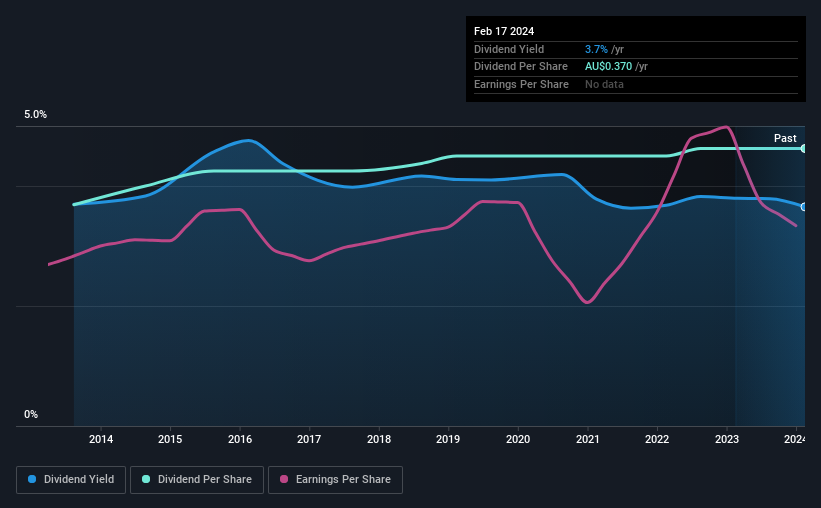Dividend Investors: Don't Be Too Quick To Buy Australian United Investment Company Limited (ASX:AUI) For Its Upcoming Dividend
Some investors rely on dividends for growing their wealth, and if you're one of those dividend sleuths, you might be intrigued to know that Australian United Investment Company Limited (ASX:AUI) is about to go ex-dividend in just 4 days. Typically, the ex-dividend date is one business day before the record date which is the date on which a company determines the shareholders eligible to receive a dividend. The ex-dividend date is important because any transaction on a stock needs to have been settled before the record date in order to be eligible for a dividend. Meaning, you will need to purchase Australian United Investment's shares before the 22nd of February to receive the dividend, which will be paid on the 15th of March.
The company's next dividend payment will be AU$0.17 per share, and in the last 12 months, the company paid a total of AU$0.37 per share. Looking at the last 12 months of distributions, Australian United Investment has a trailing yield of approximately 3.7% on its current stock price of AU$10.13. If you buy this business for its dividend, you should have an idea of whether Australian United Investment's dividend is reliable and sustainable. So we need to investigate whether Australian United Investment can afford its dividend, and if the dividend could grow.
Check out our latest analysis for Australian United Investment
Dividends are usually paid out of company profits, so if a company pays out more than it earned then its dividend is usually at greater risk of being cut. Last year, Australian United Investment paid out 92% of its income as dividends, which is above a level that we're comfortable with, especially if the company needs to reinvest in its business.
Generally, the higher a company's payout ratio, the more the dividend is at risk of being reduced.
Click here to see how much of its profit Australian United Investment paid out over the last 12 months.
Have Earnings And Dividends Been Growing?
Companies that aren't growing their earnings can still be valuable, but it is even more important to assess the sustainability of the dividend if it looks like the company will struggle to grow. If earnings fall far enough, the company could be forced to cut its dividend. With that in mind, we're not enthused to see that Australian United Investment's earnings per share have remained effectively flat over the past five years. Better than seeing them fall off a cliff, for sure, but the best dividend stocks grow their earnings meaningfully over the long run.
Another key way to measure a company's dividend prospects is by measuring its historical rate of dividend growth. In the past 10 years, Australian United Investment has increased its dividend at approximately 2.3% a year on average.
The Bottom Line
Is Australian United Investment worth buying for its dividend? While we're glad to see that its earnings aren't shrinking, we're not enamored of the fact that it's paying out 92% of last year's earnings. This is not an overtly appealing combination of characteristics, and we're just not that interested in this company's dividend.
With that in mind though, if the poor dividend characteristics of Australian United Investment don't faze you, it's worth being mindful of the risks involved with this business. Every company has risks, and we've spotted 1 warning sign for Australian United Investment you should know about.
If you're in the market for strong dividend payers, we recommend checking our selection of top dividend stocks.
Have feedback on this article? Concerned about the content? Get in touch with us directly. Alternatively, email editorial-team (at) simplywallst.com.
This article by Simply Wall St is general in nature. We provide commentary based on historical data and analyst forecasts only using an unbiased methodology and our articles are not intended to be financial advice. It does not constitute a recommendation to buy or sell any stock, and does not take account of your objectives, or your financial situation. We aim to bring you long-term focused analysis driven by fundamental data. Note that our analysis may not factor in the latest price-sensitive company announcements or qualitative material. Simply Wall St has no position in any stocks mentioned.

